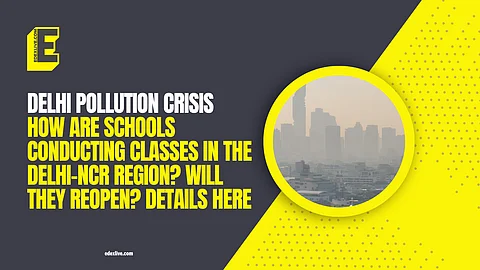

According to the latest updates, schools in the Delhi-NCR region are likely to continue offering online classes until further notice after the Commission for Air Quality Management (CAQM) recommended that they continue operating on a hybrid model, reported The Economic Times.
On Monday, November 25, the Supreme Court directed the CAQM to consider relaxing norms and evaluating the possibility of the commencement of physical classes in schools and colleges across the Delhi-NCR region.
The court cited reasons such as students' inability to access their midday meals and inadequate infrastructure for online learning.
Evaluations on reopening of schools
Due to ongoing pollution levels, the reopening of schools in Delhi, Noida, and Ghaziabad continues to be a matter of concern.
The Commission for Air Quality Management (CAQM) has instructed state governments in the Delhi-NCR region to adopt a "hybrid" mode for classes.
This decision follows the suspension of in-person classes due to dangerous air quality.
On Monday, the Supreme Court urged the air quality panel to evaluate the possibility of resuming physical classes, while ensuring appropriate safety measures are implemented.
Should schools be reopened?
As per reports, schools will remain in hybrid mode as long as the air quality remains in the severe category and GRAP IV (Graded Response Action Plan) restrictions are in place.
Authorities have not yet provided a timeline for the full reopening of schools. It is expected that in-person classes may resume once air quality improves and pollution levels return to normal.
Gurugram, Noida and Faridabad
In Gurugram, the district administration has extended the closure of schools until further notice. The city experienced two days of "severe" air quality this month. Authorities have directed deputy commissioners and district magistrates to evaluate AQI levels before making a decision on reopening schools.
In Noida and other parts of Gautam Buddha Nagar, schools will remain closed until further notice due to the "Severe+" AQI category, with pollution levels surpassing 450.
In Faridabad, the suspension of in-person classes for students up to Class XII was extended until November 26. This directive applied to both urban and rural areas.
What happened at the court hearing?
A bench consisting of Justices Abhay S Oka and Augustine George Masih noted that many students do not have air purifiers at home, implying that the exposure to poor air quality might be similar whether children stay at home or attend school.
However, the court decided not to ease the anti-pollution GRAP-4 restrictions in the region, stating that it would only consider relaxing the measures if there was a sustained improvement in the Air Quality Index (AQI).
According to The Economic Times report, local governments continue to monitor air quality closely and would issue updates based on the weather conditions.
